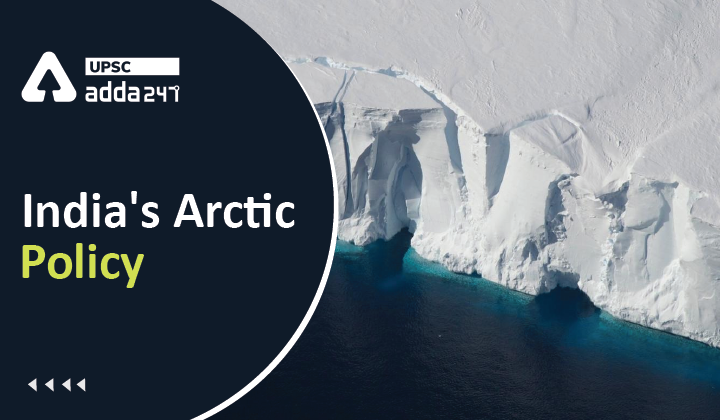Table of Contents
India’s Arctic Policy- Relevance for UPSC Exam
- GS Paper 2: International Relations- Effect of policies and politics of developed and developing countries on India’s interests.
- GS Paper 3: Environment- Conservation, environmental pollution and degradation.
India’s Arctic Policy in news
- Recently, the Union Minister of State (Independent Charge) Science & Technology released India’s Arctic policy titled ‘India and the Arctic: building a partnership for sustainable development’.
India’s Arctic Policy
- About: India’s Arctic policy titled ‘India and the Arctic: building a partnership for sustainable development’.
- Nodal Agency for Implementation of India’s Arctic Policy: The National Centre for Polar and Ocean Research (NCPOR) is the nodal institution for India’s Arctic Policy.
- National Centre for Polar and Ocean Research (NCPOR), an autonomous institute under the Ministry of Earth Sciences is the nodal agency for India’s Polar research program.
- Pillars of India’s Arctic Policy: it has six pillars which are mentioned below-
- Strengthening India’s scientific research and cooperation,
- Climate and environmental protection,
- Economic and human development,
- Transportation and connectivity,
- Governance and International cooperation, and
- National capacity building in the Arctic region.
- Implementation of India’s Arctic Policy:
- India’s Arctic policy shall be implemented through an action plan, and an effective governance and review mechanism involving the inter‐ministerial Empowered Arctic Policy Group.
- Multi-stakeholders Approach: Implementing India’s Arctic policy will involve multiple stakeholders, including academia, the research community, business, and industry.
Significance of India’s Arctic Policy
- India has moved forward to join an elite group of countries working on various aspects of Arctic.
- Arctic Council: India is one of thirteen nations holding Observer status in the Arctic Council.
- About: Arctic Council is a high-level intergovernmental forum that addresses issues faced by the Arctic governments and the indigenous people of the Arctic.
- Observer Nations: Thirteen (13) nations are observers in the Arctic Council are- France, Germany, Italian Republic, Japan, The Netherlands, People’s Republic of China, Poland, India, Republic of Korea, Spain, Switzerland, United Kingdom.
- India’s Stand on Arctic: India maintains that all human activity should be sustainable, responsible, transparent, and based on respect for international laws.
Key Objectives of India’s Arctic Policy
India’s Arctic policy aims to promote the following agenda-
- Strengthening national capabilities and competencies in science and exploration, climate and environmental protection, maritime and economic cooperation with the Arctic region.
- Institutional and human resource capacities will be strengthened within Government and academic, research and business institutions.
- Inter-ministerial coordination in pursuit of India’s interests in the Arctic.
- Enhancing understanding of the impact of climate change in the Arctic on India’s climate, economic, and energy security.
- Contributing better analysis, prediction, and coordinated policymaking on the implications of ice melting in the Arctic on India’s economic, military and strategic interests related to global shipping routes, energy security, and exploitation of mineral wealth.
- Studying linkages between polar regions and the Himalayas.
- Deepen cooperation between India and countries of the Arctic region under various Arctic forums, drawing expertise from scientific and traditional knowledge.
- Increase India’s participation in the Arctic Council and improve understanding of the complex governance structures in the Arctic, relevant international laws, and geopolitics of the region.
Conclusion: India’s Arctic policy would play an essential role in preparing the country for a future where humankind’s biggest challenges, such as climate change, can be addressed through collective will and effort.
India’s 41st Scientific Expedition to Antarctica





 TSPSC Group 1 Question Paper 2024, Downl...
TSPSC Group 1 Question Paper 2024, Downl...
 TSPSC Group 1 Answer key 2024 Out, Downl...
TSPSC Group 1 Answer key 2024 Out, Downl...
 UPSC Prelims 2024 Question Paper, Downlo...
UPSC Prelims 2024 Question Paper, Downlo...





